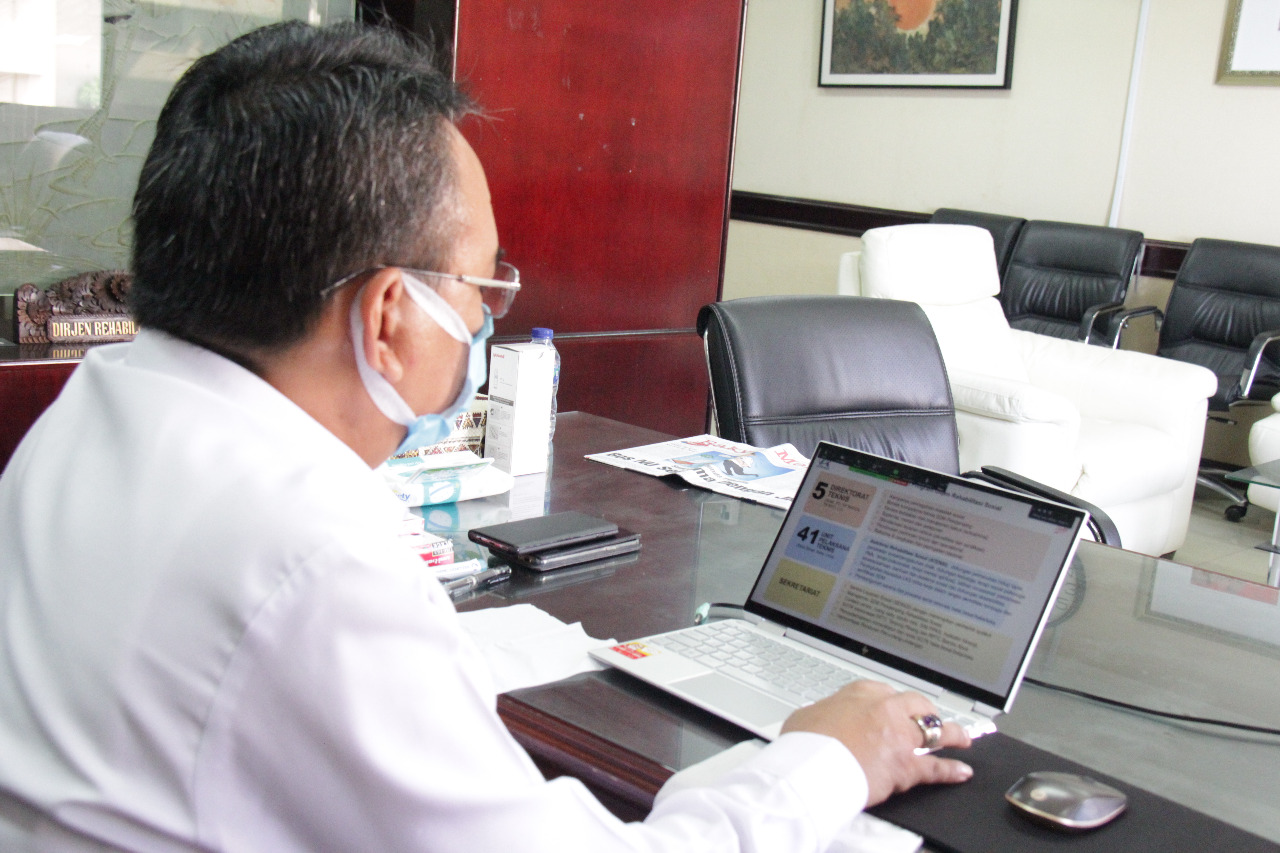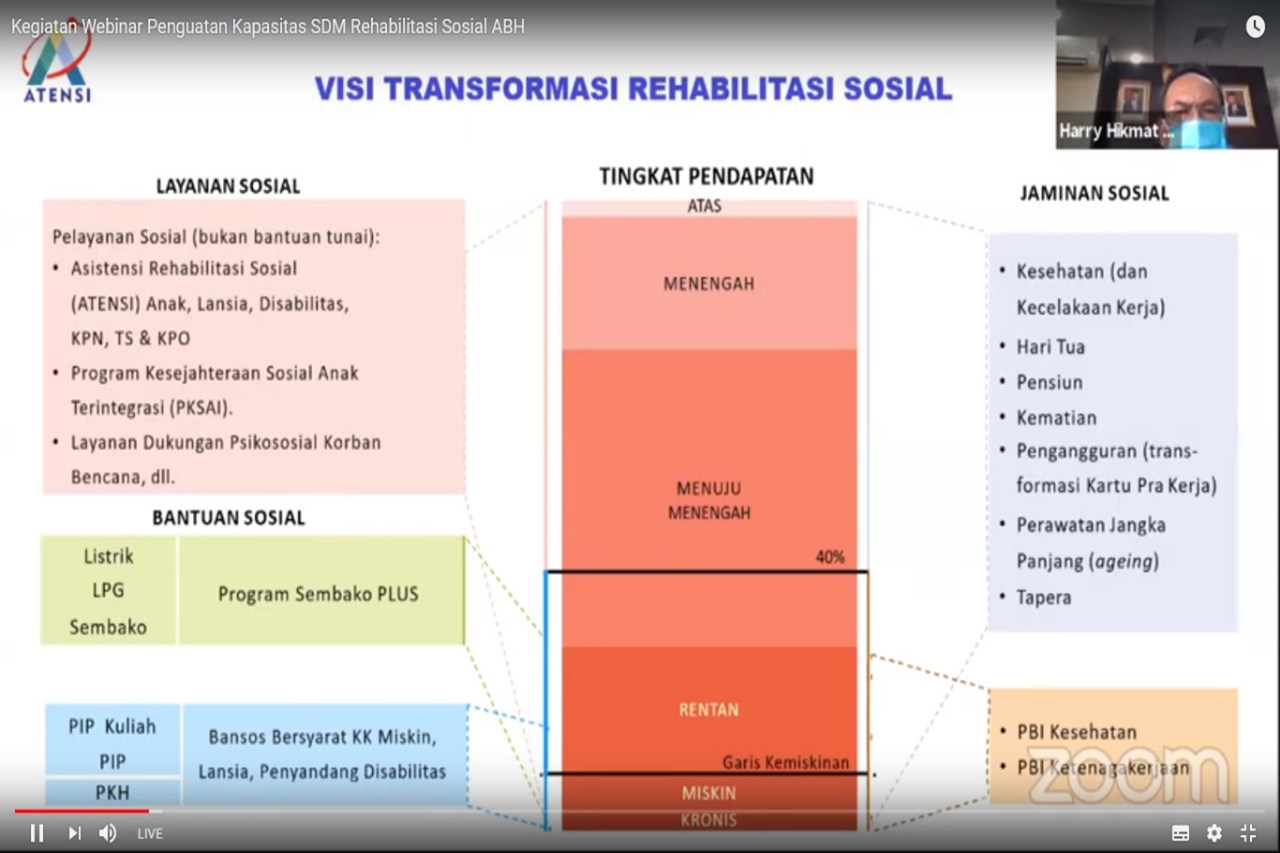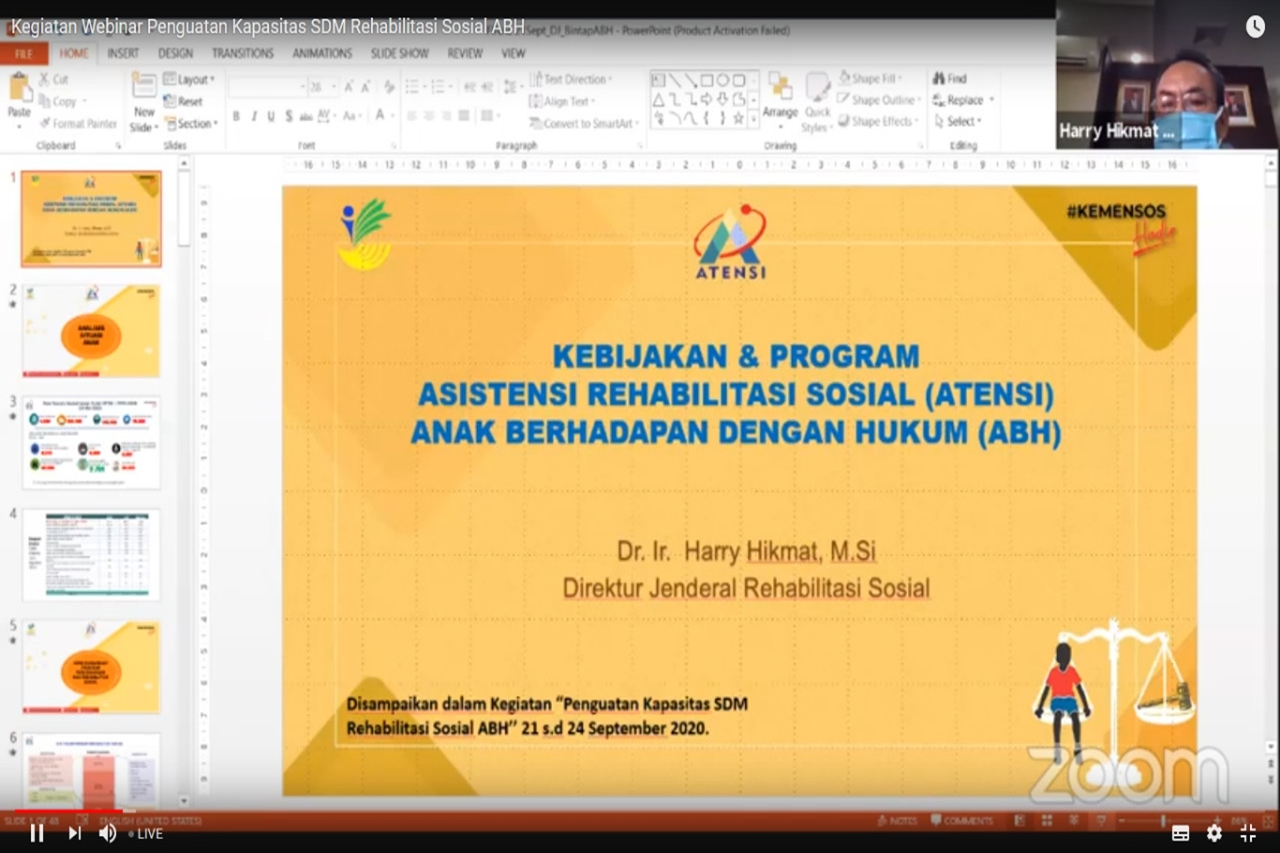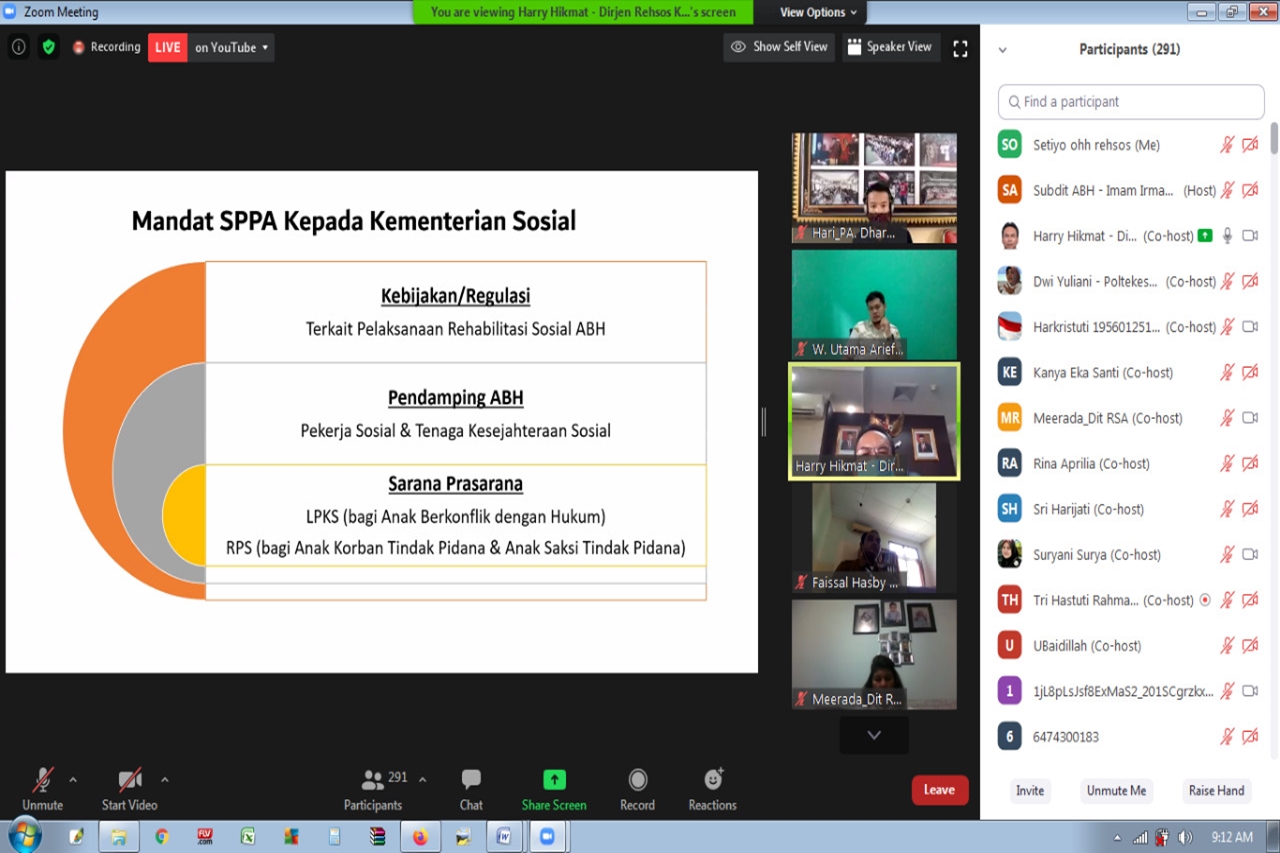JAKARTA (September 21th 2020) - The Directorate of Child Social Rehabilitation of the Ministry of Social Affairs held a Webinar and Technical Guidance on Reinforcement Human Resources (HR) Capacity for Children's Social Rehabilitation in Against the Law (ABH). The webinar activity was held on September 21, 2020 followed by Technical Guidance starting from September 22 to 24, 2020.
This webinar was attended by 300 people, namely 125 representatives of the Provincial/Regency/City Social Services, 175 Social Workers / Social Welfare Workers (TKS) / Assistants / Management of Social Welfare Organizations (LPKS) / Social Protection Houses (RPS) / Social Rehabilitation Programs for Childern Against the Law with Community-Based (PRSABHBM) and Social Workers of Social Rehabilitation Center for Children in Need Special Protection (BRSAMPK). This webinar is also live broadcast via the Directorate General of Social Rehabilitation's YouTube channel, Ministry of Social Affairs.
Webinars and Technical Guidance for Reinforcement the Capacity of Human Resources for ABH Social Rehabilitation is one of the Ministry of Social's efforts to increase the capacity for handling, mentoring and social rehabilitation services for ABH with the aim of reinvigorating the social functions of ABH according to their roles as individuals who are part of the family and society.
The webinar featured expert speakers, namely the Director General of Social Rehabilitation of the Ministry of Social Affairs, Dr. Ir. Harry Hikmat, M.Si, with the material "Policy and Social Rehabilitation Assistance Program (ATENSI) for Children in Conflict with Law (ABH)'', Professor of the University of Indonesia (Child Observer) Prof. Harkristuti Harkrisnowo, SH, M.A, Ph.D. conveyed ''Implementation of Juvenile Criminal Justice in Indonesia and the Mandate of the Ministry of Social Affairs in the SPPA Law'' and the Director of Child Social Rehabilitation Dr. Kanya Eka Santi, M.SW discusses "Policy of the Directorate of Child Social Rehabilitation regarding Children in Conflict with the Law"
This activity was carried out to increase understanding related to the mandate of the SPPA Law Number 11 of 2012 and the role of the Regional Government in handling ABH. In addition, this activity also strengthens understanding of Child Social Rehabilitation Assistance, increases the capacity of ABH social rehabilitation human resources in implementing case management, knowledge and application of child protection code of ethics and procedures for working with children.
The Ministry of Social Affairs in fulfilling the mandate of the Child Criminal Justice System Law (UU SPPA) Number 11 of 2012 has implemented improvements to regulations related to the Social Rehabilitation and Social Reintegration of ABHs through the NSPK and Guidelines for Social Rehabilitation for ABH. In addition, it also increases the availability of ABH partners (LPKS, RPS and PRSABHBM) through a Decree of the Minister of Social Affairs related to ABH Partner Institutions and increases the availability of Human Resources (HR) in accordance with the criteria for assistants working with ABH.
The Director General of Social Rehabilitation, Harry Hikmat said that based on the Integrated Social Welfare Data (DTKS) in 2020 were 2791 ABH cases. "When juxtaposed with the Case Response Data conducted by the Social Work Service Unit (Sakti Peksos) per July-August, there is a tendency to increase. Currently, there are 5364 ABH and this is the most cases compared to cases in the category of Children Requiring Special Protection (AMPK) others," explained the Director General of Social Rehabilitation.
"The vision for the transformation of social rehabilitation in the future is the social services are no longer social assistance, although in practice they are mutually reinforcing. Therefore, it is necessary to prioritize ATENSI. Cases of ABH who become victims often require health care, so in case response it must be ensured that they do not experience difficulties in accessing basic health services.' said Harry.
Harry added that the Directorate General of Social Rehabilitation has prepared a Social Service Center (SERASI) as a form of integrated and sustainable social service through the Center Link application. Piloting this one stop service at social welfare centers belonging to the Ministry of Social Affairs. Therefore, LPKS and RPS can become SERASI's back office so that they can expand the comprehensive range of services and establish cooperation with related parties in ABH social services.
"It is necessary to strengthen the social rehabilitation system that is integrated with social security, social empowerment and social protection. This effort is followed by expanding the reach of family, community and or residential-based social rehabilitation," said Harry.
Therefore, Harry emphasized the importance of strengthening the capacity and institutional capacity of the Social Rehabilitation center including LPKS and RPS, followed by massive prevention efforts by involving the local government, the community and the private sector involved in social services.
Meanwhile, Professor of the University of Indonesia Harkristuti Harkrisnowo on this occasion explained about the Implementation of the SPPA Law and the Mandate of the Ministry of Social Affairs. "Since the enactment of the SPPA Law, there has been an increase in coordination between APH and related parties, an increase in APH's understanding of the SPPA Law," said Harkristuti.
"Furthermore, an integrated SPPA training has been carried out between APH and related parties as well as an institutional improvement. Currently, there are 362 courts that already have juvenile court rooms and 72 Correctional Centers and 197 Bapas Posts," explained Harkristuti.
Harkristuti added that there are also challenges currently being faced, including differences in perceptions among law enforcement regarding diversion requirements, court decisions that do not show understanding of the SPPA Law and the unfulfilled needs for facilities and infrastructure as well as other challenges that must be understood by all relevant parties.
"In accordance with the mandate of the Ministry of Social Affairs, the efforts that can be carried out are building Professional Social Workers and TKS, building LPKS for ABH, collaborating with the Ministry of Law and Human Rights and APH and coordinating with local governments in carrying out their duties," said Harkristuti.
The Director of Child Social Rehabilitation, Kanya Eka Santi said that the Ministry of Social Affairs had collaborated with the Law Enforcement Apparatus (APH) / Ministry / Institutions in the implementation of the handling, services and assistance of ABH starting from the pre-adjudication process, adjudication to post-adjudication.
"As an indicator of the success of the implementation of the Juvenile Criminal Justice System in Indonesia, the Ministry of Social Affairs hopes to realize the implementation of a paradigm shift in the handling of ABHs through a Restorative justice approach that prioritizes the best interests of children. The handling of ABHs is carried out in a holistic and integrated manner (Integrated Criminal Justice System) as well as case handling ABH who prioritizes diversion with a restorative justice approach in every stage of juvenile justice," said Kanya.
 English
English
 Bahasa
Bahasa




